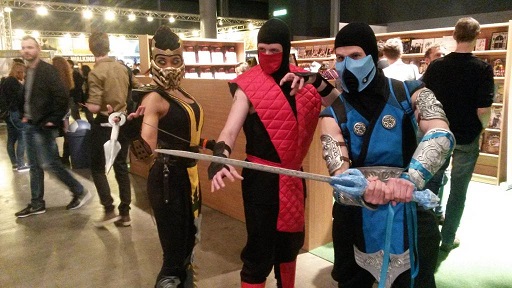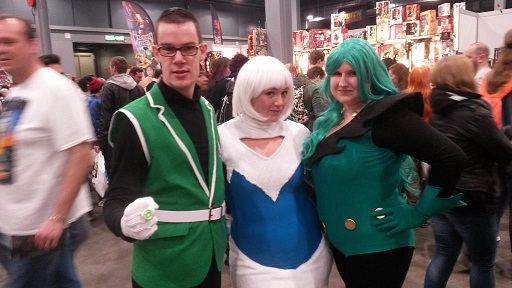The more I think about the whole Puppies situation, the more I think my initial reaction during the Emergency Hugo Panel at Dysprosium this weekend is correct: the people driving the Puppy slates do not care for fandom or science fiction, even if they call themselves fans and SF writers, they’re political operators who jumped on science fiction fandom as an easy target for their kulturwars. As Nicholas Whyte succincintly said: this is a political act that needs a political response.
And the first thing to remember is that these people for all their rhetoric aren’t conservatives, but radicals. They have a vision of what they want fandom and science to be and no respect for its values or history. What the Puppies have instead are massive entitlement issues and equally massive egos. They know they’re supposed to be the popular kids, that they have a right to the Hugos, that only a conspiracies of critics and other leftists is stopping their inevitable domination of science fiction.
All of which is pure projection on their part. Because they are the sort of people who lie and manipulate to get their slate on the Hugo ballot, they naturally assume anything they don’t like is the result of similar manipulation. Their own actions therefore are done in self defence against the shadowy conspiracy of Social Justice Warriors. It’s bogstandard rightwing conspiracy thinking that’s motivating the Puppies, the same sort of logic behind the idea that Barack Obama isn’t really the president because he wasn’t born in America, all evidence to the contrary notwithstanding.
Engaging them therefore is pointless. They don’t care about anybody who isn’t like them, don’t think anybody who doesn’t share their politics is legitamite. What to do instead?
This year, all we can do is contain the damage. There are basically three short term responses to their wrecking of the Hugos: 1) business as normal, ignoring the slate and just voting on merit, as Geri Sullivan proposed at the Hugo Emergency Panel discussion and also preferred by John Scalzi, 2) No Award everybody on the slate, innocent or otherwise and vote normally otherwise, which is what I did last year with the previous slate and 3), the most radical, No Awarding everything because the intrusion of the Puppies is so massive it’s an unfair advantage for even non-puppies to get normal consideration. This is an option Erik V. Olson explained on Metafilter:
I feel that this year’s awards are fundamentally compromised, and that maybe a better solution is this.
Vote No Award on *everything*.
Why? Because if we honestly No Award every award, then, well, no awards are given in 2015. We now have a mechanism in place to fix them — the Retro Hugos. Normally, we have to wait some large number of years (50, IIRC) to do that, but the other critera is that we only do Retro Hugo’s when there were no Hugo’s awarded.
So, if we No-Award this year, and change the constitution a bit, we could run the 2015 Retro Hugos in 2017.
It’s not a perfect answer — but it could be a better answer than most. It’ll be an award for 2015. It’ll let everyone have a fair shot again. It won’t affect the next years award like an all-kill and extend eligibility would.
There’s no good answer, but maybe that’s the least bad. But I’m personally not willing to vote for the few non S/RP nominees, because they’re not running against the works they should be running against. They’re basically getting a free ride if I do that. It’s not fair to them or to the works that were shoved off by the slate.
Which I’m honestly starting to lean towards, considering how many categories have been tainted. It’s the strongest possible rejecting of slate voting and the puppies, it could provide a fresh new start, but it would depend on enough people joining in, otherwise it’s pointless.
But at the very least all puppy candidates should be No Awarded, should be taught the lesson that if you’re on the slate, you may get nominated, but never win and now your name is mud. This should be done across the board, even for things like the various movies put on the slate, even if these were only put in as a cover. The same goes for the socalled “innocent” or “pressganged” puppy nominees, be they high profile authors who could’ve arguably had a shot at a Hugo on their own like Jim Butcher, or naive fools like Kary English. They cannot win in any category, they must be rejected entirely. Fandom must show it rejects slate voting and it rejects the attempt to make the Hugos into a partisan political mud fight.
And for those who are on the Puppy slate against their will, they should do the honourable thing: withdraw themselves from consideration.






 Some indeed, like Hawkeye in the first pic there, were at both cons. What I liked about the cosplayers was their enthusiasm, skill and generousity. People were more than happy to pose and some groups and people were very popular. There was some real creativity there as well: not just your Deadpools, Storm Troopers, Black Widows, Lokis and Thors (this time both in male and female versions), but I also saw a captain Haddock, a trio of Giffen era-JLA cosplayers doing Guy Gardner, Fire & Ice and
Some indeed, like Hawkeye in the first pic there, were at both cons. What I liked about the cosplayers was their enthusiasm, skill and generousity. People were more than happy to pose and some groups and people were very popular. There was some real creativity there as well: not just your Deadpools, Storm Troopers, Black Widows, Lokis and Thors (this time both in male and female versions), but I also saw a captain Haddock, a trio of Giffen era-JLA cosplayers doing Guy Gardner, Fire & Ice and 
 The layout of the con didn’t help. There was a huge, largely empty hall for the Q&A/music sessions, there was the main hall where you came through which was badly lit and confusingly laid out with the main sponsors and retailers, as well as the space for the autograph sessions, which took up a huge chunk on the side of the hall with crowd barriers and such but where you could only see which person was signing once you skipped the barriers and walked to their table. The secondary hall, where all the smaller retailers and standholders were located, also had a lot of wasted space at the edges and at least one lane that was too narrow, leading to huge traffic jams. It didn’t help one of the ways to reach it was through one of the con center’s food outlets. What happened to the artist alley was even worse, a few picnic tables put together in a corner inbetween the main and secondary halls, easily overlooked. Not helping matters was the lack of sign posting everywhere.
The layout of the con didn’t help. There was a huge, largely empty hall for the Q&A/music sessions, there was the main hall where you came through which was badly lit and confusingly laid out with the main sponsors and retailers, as well as the space for the autograph sessions, which took up a huge chunk on the side of the hall with crowd barriers and such but where you could only see which person was signing once you skipped the barriers and walked to their table. The secondary hall, where all the smaller retailers and standholders were located, also had a lot of wasted space at the edges and at least one lane that was too narrow, leading to huge traffic jams. It didn’t help one of the ways to reach it was through one of the con center’s food outlets. What happened to the artist alley was even worse, a few picnic tables put together in a corner inbetween the main and secondary halls, easily overlooked. Not helping matters was the lack of sign posting everywhere.



